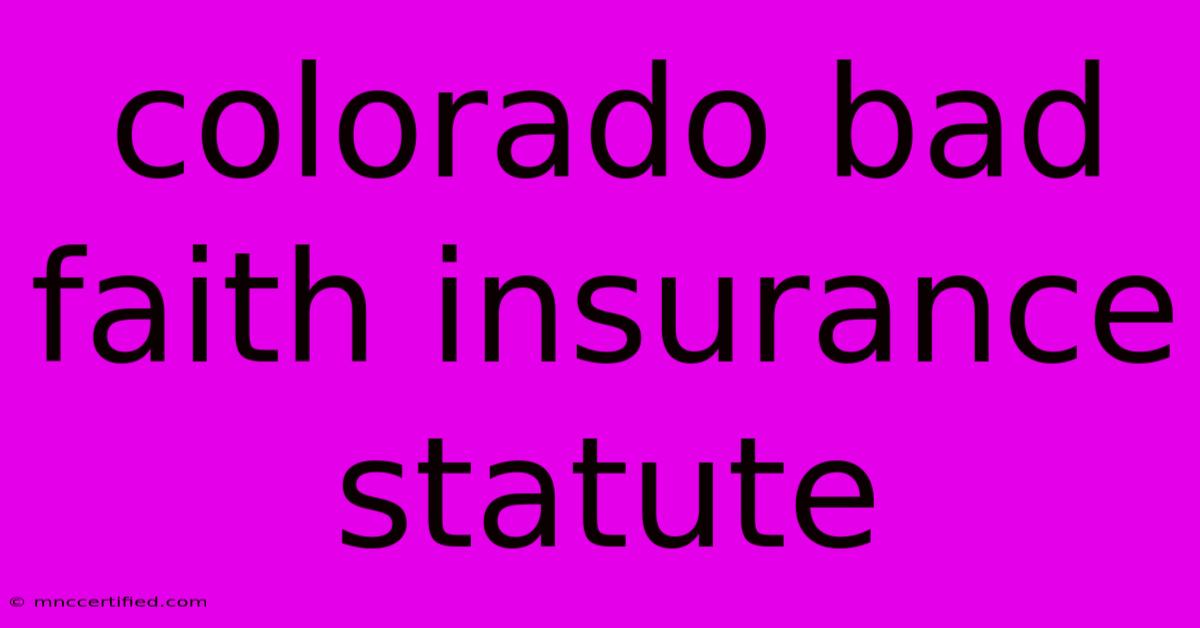Colorado Bad Faith Insurance Statute

Table of Contents
Navigating Colorado's Bad Faith Insurance Statute: Your Rights and Protections
In Colorado, insurance companies have a legal duty to act in good faith when dealing with policyholders. This means they must handle claims fairly and promptly, and cannot engage in practices that unfairly deny or delay payment. If an insurance company breaches this duty, it can be held liable for bad faith under Colorado law.
This article will delve into the Colorado Bad Faith Insurance Statute (C.R.S. § 10-3-1114), exploring its key elements, outlining common scenarios where it applies, and providing insights into what steps you can take if you suspect your insurance company is acting in bad faith.
Understanding the Colorado Bad Faith Insurance Statute
The Colorado Bad Faith Insurance Statute is designed to protect policyholders from unfair and unreasonable insurance practices. It defines bad faith as "any breach of the implied covenant of good faith and fair dealing in the performance of the insurance contract."
This statute specifically covers the following scenarios:
- Unreasonable denial of a claim: An insurance company can be found in bad faith if they unreasonably deny a claim that is covered by the policy. This could involve failing to properly investigate the claim, using false or misleading information to deny the claim, or failing to provide a clear and concise explanation for the denial.
- Unreasonable delay in processing a claim: If an insurance company delays processing a claim without valid reason, it can be deemed as acting in bad faith. This could involve taking an excessive amount of time to investigate the claim, failing to respond to requests for information, or unnecessarily delaying payment.
- Unreasonable settlement negotiations: The statute prohibits insurance companies from using unfair or unreasonable tactics during settlement negotiations, such as refusing to negotiate in good faith, making low-ball offers, or using threats or coercion.
Common Scenarios Where the Statute Applies
The Colorado Bad Faith Insurance Statute applies to a wide range of insurance claims, including:
- Auto insurance: If your insurance company denies or delays a claim for car accident repairs, medical bills, or lost wages.
- Homeowners insurance: If your insurance company denies or delays a claim for property damage caused by a fire, storm, or other covered event.
- Health insurance: If your insurance company denies or delays coverage for necessary medical treatment or refuses to pay for covered medical expenses.
- Disability insurance: If your insurance company denies or delays payment of disability benefits.
What To Do If You Suspect Bad Faith
If you believe your insurance company is acting in bad faith, it's crucial to take action. Here's what you can do:
- Document everything: Keep a detailed record of all communication with your insurance company, including dates, times, and the content of any phone calls, emails, or letters.
- Demand a formal explanation: Send a written demand letter outlining your concerns and requesting a detailed explanation for their actions.
- Consult with a lawyer: An experienced insurance bad faith lawyer can help you understand your rights and options, and represent you in negotiations with the insurance company.
Remember: It's important to take action promptly if you suspect bad faith. The longer you wait, the more difficult it may be to establish your case and obtain a favorable outcome.
Key Takeaways
The Colorado Bad Faith Insurance Statute protects policyholders from unfair insurance practices. If you feel your insurance company has acted in bad faith, be proactive in documenting the situation and seeking legal counsel. By understanding your rights and pursuing legal recourse, you can increase your chances of achieving a fair and just resolution.

Thank you for visiting our website wich cover about Colorado Bad Faith Insurance Statute. We hope the information provided has been useful to you. Feel free to contact us if you have any questions or need further assistance. See you next time and dont miss to bookmark.
Featured Posts
-
Chelsea Vs Arsenal Free Stream And Tv Info 11 10 24
Nov 11, 2024
-
Chiefs Defense Stands Strong Defeat Broncos
Nov 11, 2024
-
Bitcoin Surges To New High 2 8 Billion Wager On 90 000 Target
Nov 11, 2024
-
Mc Caffrey Excited For 49ers Season Opener
Nov 11, 2024
-
Life Insurance Deductible For S Corp
Nov 11, 2024